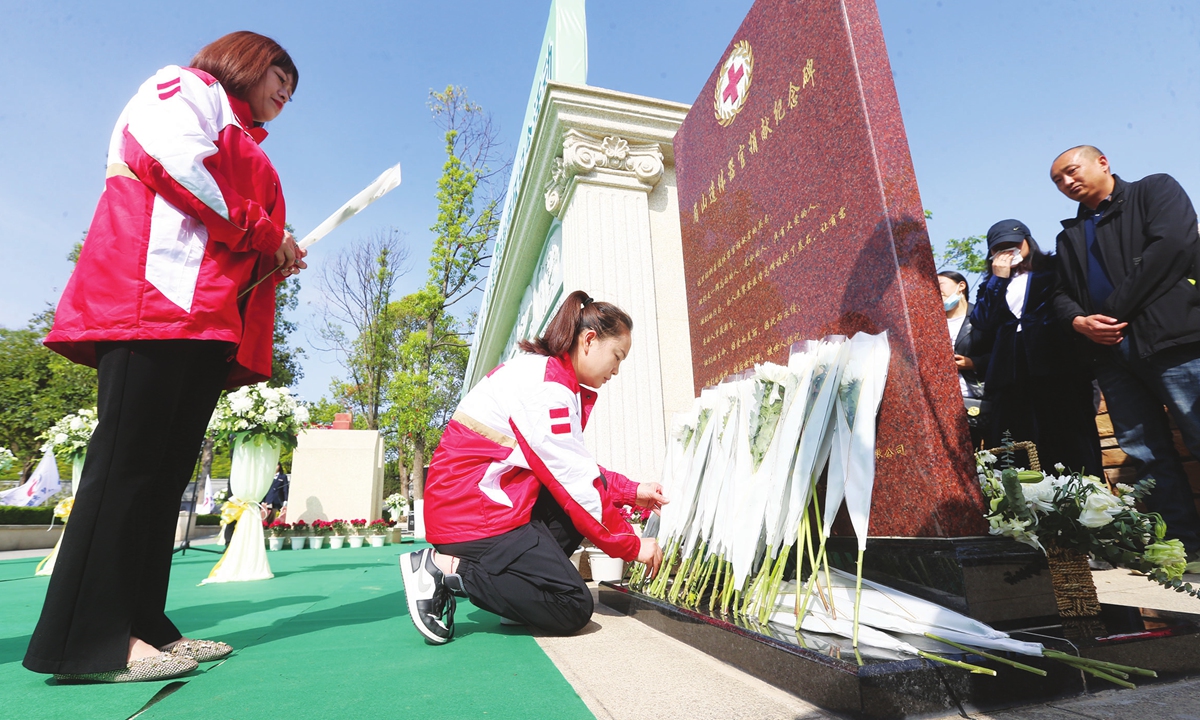
Nearly 100 people from all walks of life gathered at the Lianhua Cemetery in Meishan, Southwest China's Sichuan Province, to deeply mourn organ (tissue) donors on April 4, 2023. Photo: IC
The voluntary donation of organs to save the lives of others after the death of citizens is a noble act worthy of respect from all society. Through years of endeavor, the development of China's organ donation and transplantation program has achieved tremendous progress, with the total number of registered organ donors exceeding 6.18 million, top health officials said recently.
According to the Red Cross Society of China, nearly 1.54 million people registered as organ donors in 2022, compared with around 1.52 million in 2021 and 1.01 million in 2020. Data from the organization also showed that China has completed 44,000 cases of posthumous organ donation, with more than 135,000 organs donated.
Behind this growing number of donors involves the dedication and effort of as many as 5.83 million volunteers.
Wu Yue, a woman from Nanjing, East China's Jiangsu Province, who has received two double lung transplants, became a body donor in 2022. When she was 26 years old, she was diagnosed with middle- and late-stage lymphangioleiomyomatosis in 2013. The disease, a rare form of lung illness that affects only five in a million women, has no specific treatment.
It wasn't until Wu met two donors who were a perfect match that she regained her health. Because of the double-blind rule, Wu could only give them memorable names from brief media reports. Even though she knew she could not contact the donor directly, Wu insisted on writing a letter every year to express thanks and commemorate her rebirth.
Wu told the Global Times that as a volunteer, she found that not every organ donor was willing to disclose their identity for fear of social discrimination and injustice, but with the continuous efforts of various organizations in recent years, the number of organ donors has increased significantly, especially among the younger generations.
"Over the years, I have met many donor families, it was amazing that even though [they] weren't the family of mine, I still feel that they are the closet relatives to me."
In 2015, Liao Yuan applied to participate in the coordinator training class the China Human Organ Donation Management Center held and officially became a human organ donation coordinator. Over the past seven years, she has participated in more than 500 organ donation cases and deeply felt the pain that ordinary people can hardly imagine behind the noble actions of donors and their families.
According to Liao, communicating with family members face to face, explaining donation policies, witnessing family members sign donation consent forms and the acquisition and allocation of donated organs under the principle of voluntary compensation, ensuring that each donation is carried out fairly and justly according to family members' wishes, and timely reporting donation information, are a coordinator's responsibility, as well part of the difficulty of the job.
"To fulfill my duties and ensure the successful completion of each donation, I need to be on standby 24 hours a day and start at any time. In the face of high-pressure work, I have many moments of hesitation," Liao told the Global Times.
"However, every time I saw the relief messages from the donor's family when they learned that the operation was successful and saw the smiling faces of the patients and heard the heartbeat sound like 'thank you' coming from the patient's heart after the surgery, gave me the courage to carry on."
In China, voluntary donation from citizens is the only legal source of human organ transplants. Speaking of organ donation, there are always a variety of voices in China. Sometimes, people who don't know the truth may have doubts about the legitimacy of donating organs.
"However, we volunteers, the donors' families and the recipients know," another volunteer surnamed Zhang said.
When asked which volunteer impressed them the most, many volunteers mentioned the story of Nika.
Nika (pseudonym), a Russian girl, lies quietly in the operating room of the First Affiliated Hospital of Guangxi Medical University on November 16, 2022. Her husband Ouyang kissed her on the cheek and said he was sorry: "Can you stay? I really want to part with you..." Nearby, medical staff with tears in their eyes bowed sincerely to Nika.
Nika traveled to China in 2018 and fell in love with the country and she began looking for a job in music so she could stay in China. She met Ouyang and they immediately fell in love with each other and soon got married.
But in 2022, Nika was diagnosed with a pulmonary embolism, and after a cardiac arrest she suffered an irreversible brain damage. In spite of all their efforts, doctors still could not save Nika's life. Finally, Ouyang signed a consent form for his wife to donate her organs after obtaining the consent of Nika's mother. On November 16, Nica's organ donation operation was completed, bringing new life to four people. It is also the first organ donation by a Russian citizen in China.
"We volunteers have seen not only the love between the couple, but also their kindness and generosity. It gives us a new understanding of life and death. So, I always believe that no matter whether someone is willing to donate or not willing to donate, as long as they are willing to understand and support organ donation, we will thank them for their support with the greatest empathy," Zhang said.


